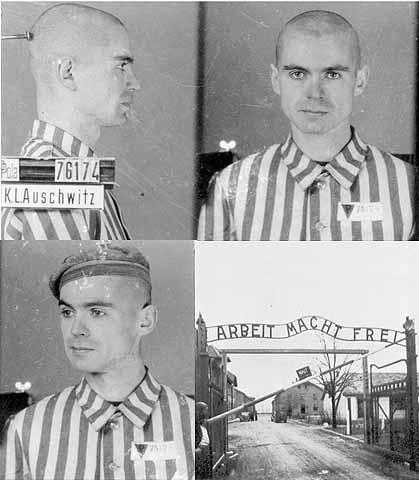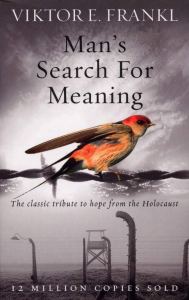Earlier this year I picked up this book I have had for about a year now. The title, Man’s Search For Meaning, written by Viktor E Frankl. I had no idea about what is in this book.
I was having a low time in my life and maybe thought that this book might give me some motivation or a nudge towards the right direction. 2020 has been a weird year for me. I was looking for some guidance somewhere, anywhere I could find it.
To my surprise the book was about what real suffering is, and it put everything in it’s rightful place for me. This small book changed who I am.
Let’s get to what Frankl had to say about concentration camps and finding meaning in one’s life.
Frankl saw three possible source for meaning: in work(doing something significant), in love(caring for another person, as Frankl held on to the image of his wife through the darkest days in Auschwitz), and in courage in difficult times.
This sentence alone helped figure out quite a bit about life, career choices and choices in general. Work is what takes the most amount of time in our lives.
And through our work we are able to recognize ourselves, figure out who we really are. So being able to choose what we work upon, how we work upon those things is definitely a big plus.
Love is something that motivates and pushes us. I would say that it is also what is responsible for the courage in difficult times.
People who matter to us the most can push us through hard times even if they are not with us.
Like a drowning man clutching saw a straw, my inborn optimism(which has often controlled my feelings even in the most desperate situations) clung to his thought: These prisoners look quite well, they seem to be in good spirits and even laugh. Who knows? I might manage to share their favorable position.

So, Frankl talks about his optimism right as he is about the enter the camp for the first time. Even though in his heart he know what happens to people at these camps, there is a spark of optimism inside him. And sometimes this spark of optimism is what can keep us going through everything that is troubling us.
This inborn optimism as Frankl points out is what can be that one straw, the only straw you need to save yourself from drowning.
In psychiatry there is a certain condition known as “delusion of reprieve”. The condemned man, immediately before his execution, gets the illusion that he might be reprieved at the very last minute.
We, too, clung to shreds of hope and believed to the last moment that it would not be so bad.
There might be a delusion of reprieve thing going on in our minds, but at least it helps us go through the really bad stuff sometimes.
Fifteen hundred captives were cooped up in a shed built to accommodate probably two hundred at the most. We were cold and hungry and there was not enough room for everyone to squat on the bare ground, let alone to lie down. Once five-ounce piece of bread was our only food in four days.
The conditions that these guys had to live in, just reading those made me a better human being. We sometimes forget to appreciate the small things, the tiny pieces of goodness around us. This put it all into perspective for me.
So, this is when the lockdown had started around April 2020, I was feeling weird that I cannot order a pizza, or get a McDonalds burger.
Upon reading that these guys had a loaf of bread as food for 4 days and they had to do tons of manual labor just put me in a space where a pizza would have been nice but I will not allow “no pizza” to ruin my mood or how I am feeling about life.
My family was safe and healthy, my wife, and me were safe and healthy and that is all that was important.
Suffering is relative. We believe we have it worse off than someone else until we get to really hear what they are going through. And sometimes our suffering just becomes irrelevant in the grand scheme of things.
Once again just getting to know someone else’s story is enough to make us feel the importance of everything we have instead of crying over spilt milk.
The significance of the finger game was explained to us in the evening. It was the first selection, the first verdict made on our existence or non-existence. For the great majority of our transport, about 90%, it meant death.
Their sentence was carried out within the next few hours.
Those who were sent to the left were marched from the station straight to the crematorium.
“Was he sent to the left side?”
“Yes,” I replied.
“Then you can see him there,” I was told.
“Where?”
A hand pointed to the chimney a few hundred yards off, which was sending a column of flame up into the grey sky of Poland. It dissolved into a sinister cloud of smoke.
“That’s where your friend is, floating up to the Heaven,” was the answer.

This one was a heavy one.
I have thought about this sentence and tried to think about how they might have felt about the fact that a simple finger pointing to left or right can be the difference in them living or being burnt alive.
No matter how hard I try I cannot un hear or un imagine what went through my mind when I first read this paragraph.
I am making sure to include it here just so that we know that sometimes finding meaning means just being happy at the smallest of wins and not let the biggest of losses weigh us down.
Sometimes the other men invented amusing dreams about the future, such as forecasting that during a future dinner they might forget themselves when the soup was served and beg the hostess to ladle it “from the bottom”.
Our soul finds a way to live, we learn to let things and events pass as time passes. We realize that the only thing that will stay is how we react towards things that happened in the past.
Human imagination and our abilities to think of an optimistic future is sometimes all that can keep us going through the really bad ones.

I learnt a very important lesson from this “from the bottom” joke. Sometimes a small chuckle is enough to pull us out of a pattern of self inflicted or even externally inflicted misery.
One literally became a number: dead or alive – that was unimportant; the life of a “number” was completely irrelevant. What stood behind that number and that life mattered even less: the fate, the history, the name of the man.
For instance, I heard one prisoner talk to another about a Capo, saying, “Imagine!” I knew that man when he was only the president of a large bank. Isn’t it fortunate that he has risen so far in the world?”
The experiences of camp life show that man does have a choice of action. There were enough examples, often of a heroic nature, which proved that apathy could be overcome, irritability suppressed. Man can preserve a vestige of spiritual freedom, of independence of mind, even in such terrible conditions of psychic and physical stress.
‘I will throw you into prison.’ ‘Correction – it is my body you will throw there.’ ― Epictetus
No matter what we go through in life. Remember we always will have a control over our minds.
And it is our mind that can get us to come out of the most ridiculous of a pickle.
We who lived in concentration camps can remember the men who walked through the huts comforting others, giving away their last piece of bread. They may have been few in number but they offer sufficient proof that everything can be taken from a man but one thing: the last of human freedoms – to choose one’s attitude in any given set of circumstances , to choose one’s own way.
Be good to yourself, be good to humanity, don’t take everything too seriously, live for the good times and push through the bad times.

